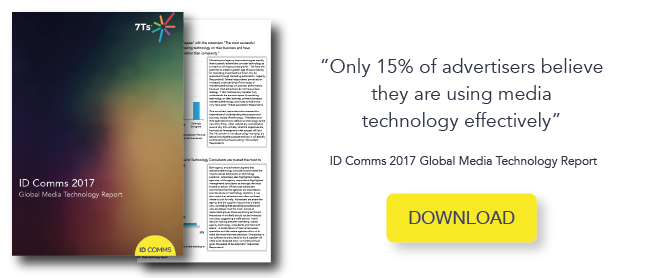Research finds lack of knowledge leaves advertisers beholden to agency solutions.
A new report by ID Comms has found that 41% of advertisers admit they are still using media technology “ineffectively” or “completely ineffectively”.
The technology, which is now used to power most digital media buying, is now an essential part of the media landscape but only 15% of advertisers claim to be using it “effectively”. No marketers claimed to be using it “very effectively”.
Advertisers also admitted that they had a lack of understanding of how each technology platform within the stack contributes to the value chain and serves specific business/media goals. Eight percent claimed a “good understanding”, 67% “some understanding”, 22% “little understanding” and 3% “no understanding”. No one claimed a “full understanding” of the role of their tech stack.
Download ID Comms 2017 Global Media Technology Report.
While agency participants were more bullish – 24% said advertisers were using tech “effectively” – the ID Comms 2017 Global Media Technology Report found they have also benefited from the lack of knowledge around the new tech landscape.
The vast majority of advertisers agreed with the statement “Advertisers inability to keep up with the rapid evolution of the tech landscape makes them over dependent on solutions provided by their agency”. In total, 83% either “agreed” or “strongly agreed”. Even 37% of agency respondents agreed.
The poor performance and dependency of many advertisers contrasts with the agreement on both sides that successful advertisers understand the impact of marketing technology on their business and have a clear strategy for ensuring it adds value rather than complexity. Seventy-five percent of all respondents either agreed or strongly agreed.
ID Comms 2017 Global Media Technology Report also found that advertisers were turning to a wide variety of advisers in their search for guidance on the best technology to use and how to deploy it. Whilst both agency and advertisers agreed specialist tech consultants are trusted most often to advise advertisers on tech solutions (30% and 28% respectively), advertisers also highlighted media agencies (23%) and agency participants highlighted management consultants (19%) as trusted advisors in this space.
“What we find with these results is that marketers have a concerning lack of understanding about the precise impact that marketing technology is already having and will continue to have on their wider business, said Susy Pyzer-Knapp, Consultant at ID Comms. “Marketers demonstrated anxiety over the rapid pace of change, anxiety about where to seek objective advice and an over-dependence on on agency-provided solutions. There has never been a greater need for marketers to get to grips with this area.“
The findings are based on responses from 229 respondents. The respondents were comprised of Marketing, Media and Procurement professionals with a range of global, regional and local market responsibilities, representing companies spending over $40bn globally on advertising each year. 77% of the respondents were Europe-based, 11% were from the US and the remaining 12% representing the rest of the world.
Other quotes from respondents:
Advertiser: “A combination of internal resources, specialists and the media agency allow us to make the most informed decisions. One advisor is not sufficient and any decision for a supplier will need to be reviewed every 12 months at most given the speed of development.”
Trade Association: “I don't believe any marketer truly understands the precise impact of marketing technology on their business, primarily because marketing technology continues to evolve at a very rapid pace.”
Consultant: “Marketers and their agencies tend to default to technology as the new shiny thing, the latest that will help them attract consumers/shoppers to their brand often without any consideration around why this will help, what the objectives are and how best to leverage and what success will look like. My concern is not about using/not using, it's about knowing the purpose and how it will actively contribute to business building.”
Vendor: “The specific specialist within the client probably has a good understanding, but has not enough channel to the person the matters (CMO or marketing director) They sadly have little understanding. There is knowhow, but not always in the right places.”
Consultant: “Advertisers need to gain full perspective from agencies, tech partners and their own IT. It all needs to come together against a clear strategy and balanced in terms of how it fits within existing client IT ecosystem in both short and longer term. All advertisers (like all agencies) struggle to get the systems to work together in efficient and effective way and to be flexible enough to easily adapt to changes.”
Media Agency: “Both advertisers and agencies have the tendency to put the technology cart before the creative horse. This perhaps, could be a result of being pushed to use ‘technology in an innovative way’. This is further driven by short-termism and the promise that media technology will deliver zero waste, a tremendous ROI, and full attribution of media spend.”
Download ID Comms 2017 Global Media Technology Report.
Insights from the ID Comms 2017 Global Media Technology Report were also covered in WARC, AdAge, Research Live, Programmatic, MediaPost, MoreAboutAdvertising, Marketing Interactive, Digiday and Arabian Marketer.







COMMENTS